- Home
- Adam Thorpe
No Telling Page 33
No Telling Read online
Page 33
‘Is that the end?’ sighed the priest. It was one of the older ones, probably Père Romains. He always sounded as if he despised you for being there.
‘I’m having dreams.’
‘Waking, sleeping?’
‘When I’m asleep.’
‘So?’
There was a movement behind the grille. I could just see a finger inside a nostril, poking about. I felt dizzy, almost as if I was going to faint. I couldn’t speak. My tongue was cloven to my mouth.
‘Unclean dreams, child?’
‘It’s this woman, a friend of my parents. I’m – doing things with her.’
‘Speak up, I can’t hear.’
I was worried that the queue could, though. It wasn’t really near enough, but the old frayed curtain seemed so thin. I could hear echoey shuffling and footsteps and coughing through it.
‘It’s a friend of my parents,’ I hissed. ‘She can’t walk. I can’t stop my unclean dreams about her, Father.’
Why did I tell him that she couldn’t walk? I wanted to say her name – I could hardly stop myself saying it. The grille’s metal smelt of polish, though it was all dark and rusty.
‘As long as you do not touch yourself, child. Do you touch yourself?’ Père Romains asked, quietly. From the way his voice sounded (like a duck’s), I could tell he still had a finger up his nose.
‘How?’
‘In an unclean way?’
He sounded more interested, now.
‘Not really,’ I said. I wasn’t quite sure what he meant.
There was a long sniff, and then a sigh.
‘Not really, not really,’ he imitated. ‘Cleanse your mind with the detergent of prayer, child. Wash it out with the soap of contemplation before you drop off. Five Hail Marys. At least. Do you regret your sins?’
‘Yes.’
‘Go, and sin no more.’
‘Amen.’
‘Wait.’
I waited, heart thudding. He never said ‘wait’, usually. There was a scuffle behind the grille and then it slid open. Père Romains’ hand came through, old and veiny and with dirty nails. It was holding a ten-franc note.
‘Let’s do a deal, child. Like all good Catholics. Run along to the butcher’s. Get me a mutton cutlet and two chicken thighs. Bless you. That’ll cancel out literally hundreds of your unclean dreams. The place’ll be closed by the time this lot are finished with. You don’t want me to starve over the weekend, do you?’
‘No, Father.’
‘My housekeeper is ill. Silly woman. Hysterical. Go on, then.’
I could only see one eye above the flapping hand. It was yellow and watery, framed by the square hole.
I took the note.
‘Amen. I mean – yes, Father. Thank you very much.’
I left the box and did my contrition and then speed-walked past the two lines of waiting children, out into the noisy brightness. Then I ran. I was happier than I had been for weeks. I felt a great relief. I felt cleansed.
‘No chicken thighs I’m afraid, my master.’ Christophe’s father grinned at me, leaning over the counter. ‘You could have my thighs, of course, but I need them,’ he added, winking at a young girl not much older than me. She had bought a large saucisson and was waiting for something to be cut up at the back of the shop.
I went bright red, of course, and the young girl’s eyes flickered over mine. The saucisson reared up between us and was poisoned by my foul thoughts. It wasn’t the foul thoughts that I was ashamed of, it was the idea that the girl and everyone else would know that my mind was thinking them, even though I didn’t want it to, even though it was the fault of a tiny devil who had slipped in without me noticing, like a fat tick.
It was worse than the time in the posh restaurant with Jocelyne. I had never felt my face so on fire. If I was a really good person, I thought, I wouldn’t feel shame at all: I must be the filthiest mind that has ever lived.
My vision blurred, the meat mixing up with the white tiles. I started to worry about migraine. Christophe’s father thought it all a big joke, of course, and said he could grill a wild boar on my cheeks. Then he said something in German, as usual.
‘Don’t shout, Juliette,’ he shouted over his shoulder to the girl with the saucisson, who hadn’t opened her mouth. ‘I can’t bear loud noises, sweetheart.’
Juliette giggled, her cheeks going rosy. He got me to buy some turkey thighs instead of the chicken. The thick lumps of raw flesh were heavy in my hand, the wetness seeping through the brown paper like plum-juice. Every time Juliette moved a bit in the corner of my eye, my blush got deeper again, so that she must have thought I was thinking about her even though I wasn’t. It was almost unfair. I didn’t even have the courage to ask if Christophe was about.
I went out and round to the main house and pressed the old green bell. Christophe opened the door. He’d had his head shaved, like an American convict in a chain-gang. He looked completely different.
‘Lice,’ he said. ‘That bloody cretinous cat, I reckon. I’d like to napalm it.’
‘Let’s try to break in,’ I said.
‘To our place?’
‘Yeah.’
‘Bring the TNT, then.’
Together we walked to the old military hospital, dropping off the meat at the church on the way. The two lines of children were already much shorter. I knocked on the confessional and Père Romains opened the curtain. He took the meat as if he hadn’t eaten in days. He took back all the change, too, down to the last centime. I told him it was turkey, not chicken.
‘Bless you,’ he said. ‘It’s meat. Now I won’t wither away like the fruit on the vine. My stupid stupid housekeeper. Hysterical female.’
The legs of the confessant, under the other curtain, looked stuffed. Some of the younger children made raspberry noises as we passed them on our way out. The verger slapped each of them around the head.
‘You could put a ventriloquist’s doll in the confessional,’ I said, as we made our way to our secret place. ‘You could put a magnetic tape recorder inside it and it’d be great, you could say really stupid things.’
‘Filthy things.’
Yeah.’
‘That’s what I feel like, anyway,’ Christophe said. ‘A bloody ventriloquist’s doll. When I’m conpissing.’
I wasn’t quite sure how we were going to break in to our place, in fact. We went over all our ideas again, getting more and more excited, and so were totally unprepared for the shock.
The gates were wide open. The ground around the gates had been churned up by enormous tyres, their treads going all the way across the grounds to the main building. Some of the pines had had branches torn off, the green bits lying squashed and broken on the ground.
We stood there for a moment, not wanting to approach. A red-and-white chain had been slung across the gap to stop vehicles entering, with the Défense d’Entrer sign dangling from it. It was Saturday and quite late in the afternoon, so there was no one working. There was no one around at all, in fact.
We slipped under the chain and strolled in, the mud splashing our shins. The resin smell was quite strong because of the branches being torn off – there were big white scars on the trunks. The carpet of pine-needles had black gouges where the lorry, or whatever it was, had backed up or turned. Near the stone steps that led up to the main door there was a red post; it had been hammered into the ground and a number marked on it in bright orange. Next to the post was a small hole. It looked very deep, going right down into the centre of the earth. We gazed down this hole into the pitch blackness.
‘Maybe they’re looking for fucking oil,’ joked Christophe.
‘Could be a gang, hiding their loot.’
‘Could be, yeah.’
‘I wish we had a torch.’
It was very quiet. I tried calling down the hole but it didn’t echo. When we dropped stones into it – small stones, or pieces of rubble – there wasn’t the plop of water. In fact, there wasn’t any sound at all.
> We started tossing these stones at the main building, pretending they were grenades. Together, without saying anything, we began to aim at the windows. The gates were open, anyone could see us, but we carried on throwing, aiming at the windows. There were four floors, and fifteen windows on each floor, and each window was divided into several panes. When one of my stones, or bits of rubble, hit and cracked or even smashed one of these panes quite high up, it felt very good.
Christophe was not as accurate or as lucky as I was, his stones mostly bounced off the brick. Even when they hit the windows, they often just bounced back. If we cracked a pane, we’d aim for that weak spot. We weren’t allowed to step beyond a line drawn on the ground, yet a very big throw could reach the top row of windows.
When a pane smashed, it didn’t sound like glass smashing. It sounded like someone diving – like the swallow-diving I’d seen performed in the municipal swimming-pool.
Plouvoutch!
Perhaps this was because of the empty rooms behind, with their rotting mattresses on which the pieces must have fallen: or perhaps it was because the windows were quite a way away. Or perhaps it was the age of the glass – over a hundred years old, probably. There was a kind of magic in it, anyway: I’d hurl a stone, it would turn into a sort of flicker or disappear completely for a second or two and then (every so often) there’d be this strange splashy sound and the window would go dark and I knew my stone had gone right through. Every time it did this I felt an incredible satisfaction.
We felt full up after about an hour. Not even a quarter of the panes had been broken. We had hardly said anything, only grunted as we threw, whooping when we got a hit. It had all been very serious and concentrated. Now we were exhausted, our arms aching, our hands rough from the stones and bits of concrete rubble.
We left almost without speaking. I didn’t feel any guilt. I didn’t feel frightened, either, by what we’d done. We hadn’t even pretended to be soldiers fighting off battalions of tanks. We’d just enjoyed smashing windows.
That evening, funnily enough, the television news had pictures of American people throwing stones because a famous priest had been shot dead during the week; it was like watching myself from the outside.
‘That’s really bad, to shoot a priest,’ I said.
‘He wasn’t Catholic and he was black,’ said my mother. ‘But it was still very wicked to shoot him.’
The next day Christophe and I had another go and then, on Wednesday afternoon, we went back again and broke even more windows and then again two days after that, like people on drugs.
The gates were open each time. The place looked just as abandoned, except that now we found crumpled cigarette packets and empty wine bottles. There was even a bedraggled pink cardigan, a bit like a dead body. Our aim improved, and the third time I broke twenty-three panes. We still didn’t pretend we were throwing grenades or anything. We were just doing what we were actually doing.
The main building’s windows were almost all broken, now. About a dozen of them still flashed back the light. It felt weird, that we’d been able to do so much damage to something so big.
‘My muzzle-loading capacity’s slowing down,’ Christophe joked. ‘The flash hider’s so hot it’s glowing.’
‘OK. Let’s quit.’
Then it was Easter and the long service started outside in a drizzle and ended up about a thousand years later with everyone starving. One of the priests, our catechism teacher, locked himself out of the vestry afterwards. My uncle came to the rescue by going to the telephone box and calling locksmith after locksmith until one was found who worked on Easter Sunday: he was small and fat, with a satiny red beret and thick round glasses. My uncle said he was just like the one in the film La Belle Américaine, except that this one wasn’t drunk and it was a vestry instead of the boot of a beautiful American car. I wondered when he’d gone to see the film. People in grey or brown hats, whose faces I knew, kept asking me if I was ready for my Solemn Communion in a month’s time. Every time they asked, I got butterflies.
The day after Easter Monday, at the beginning of the holidays, I set off for our secret place with Christophe to deal with the last survivors. Neither of us had wanted to go back on our own. We reckoned now it would be difficult to aim correctly just for those few, and this made us more excited. My bicycle had a puncture, so I got onto the back of Christophe’s mobilette out of sight of the shop.
Immediately, I felt a burning pain on my shin. I’d scorched it on the exhaust. We decided to walk, Christophe wheeling the mobilette. The burn made me limp a bit.
We were a street away when we realised that something had changed.
There were new shapes in the sky; I pointed them out to Christophe. The old hospital’s thick brick chimneys had disappeared. The new shapes were not new, they were the buildings that had been hidden by the chimneys. A huge plume of smoke or dust rose up and joined the clouds.
I ran, ignoring my burn. Christophe pedalled his mobilette into life, keeping the same speed as me. We arrived exactly together.
15
Except that there was nowhere to arrive at, in fact: just mud and rubble and dirty smoke.
There was nothing. Or we were in a different place. That’s what it felt like. A completely different place.
The high outside walls had gone; the pine-trees and the prefabricated wing and the big main building itself with its flight of steps had gone; our broken bench and our bicycle assault course and Christophe’s nuclear-powered invalid-chair had gone. Even the Gestapo side-car had gone. Completely vanished. They had all been replaced by a sea of mud.
Huge diggers bumped over the mud, shoving it about. It was like a trick.
I could see washing flapping on washing-lines on the far side where the wall had been. It had hidden people’s back yards. The linen must be getting dirty, I thought.
‘Shit,’ said Christophe, ‘that was a fucking big stone you threw.’
I didn’t laugh. In fact, I wanted to cry.
We asked someone shyly what was going on – going up to this African man in a hard white builder’s hat near a belching fire, and stammering out the question. He had to shout because one of the diggers was approaching. We didn’t understand him, he might have been telling us to clear out.
A tall sign on stilts gave the name of the company and a list of people: architect, site manager, developers, master of works, carpenter, interior fitter, plumber, electrician. The wrought-iron gates were leaning on the wall opposite as if drunk. The fans of cobbles were hidden under mud and rubble so that we couldn’t even see where our secret republic had begun.
‘Open sesame,’ I joked, waving my hands about.
Christophe didn’t respond; the digger was chugging too close for him to have heard, probably. His open mouth made him look mentally retarded, especially with his shaven head. Then he yelled out a swearword, and another stronger one, and flapped his hand in amazement as if the coin had only just properly dropped.
Now we knew what the man with the oily hair and the clipboard and the torch had been doing. There was something sticking out of the mud: it was a big branch off a pine-tree. It was stuck. I got resin all over my fingers, but I tore off a bit with pine-needles on it.
Christophe and I hung about for a while and then went back to my house. The weird thing is, we didn’t talk about the demolition, even though I brought back the pine twig. We didn’t really talk much at all. We just sat in my room, playing tennis with a rubber and our bare palms. I was on the bed, Christophe was on the floor. The rubber bounced under the bed. He reached for it and pulled out the ballet book instead. He made a face at the title.
‘I got it for Carole,’ I said, a bit quickly.
The book fell open at the photograph of the Coppélia dancer, probably because I’d looked at it too much. Christophe whistled.
‘I like your bird,’ he said.
He started reading a page from the Coppélia story in a silly girly voice, kneeling on the rug. I interrupted, tell
ing him that the story was about a sort of stunning girl robot.
‘A girl robot?’
‘Yeah, and this bloke falls in love with her and the robot-maker drugs him and tries to transfer his human energy to the girl and then the bloke’s real girlfriend, who’s incredibly jealous and everything, finds out that the stunning one’s not real and dresses up as her, as the robot, and pretends to go mad, smashing up the robot-maker’s place and saving her boyfriend. The robot’s called Coppélia. The one in the photo, my bird, danced the girlfriend who pretends to be the robot and became really famous. Then I think she died because of that war—’
‘I – am – a – robot …’ Christophe said, in a flat robot-voice, his hands stuck out and his neck all stiff. I – fancy – your – tits … I – want – to – fondle – your – fa – nny—’
The dancer stared up at him as if she thought he was stupid.
‘I saw this mime artist doing a robot on the telly,’ I said, trying to stop him by being sensible. ‘It looked real.’
When Christophe had gone, I put the pine twig in the special drawer with the ballet slippers and the SS books. I felt more shocked now than I had just after seeing everything gone.
My uncle told me, when I asked, that they were building a block of flats, that the HLM project they had been ‘pissing about with for years’ was finally going ahead. He talked about it as if he was personally involved, as if he had something to lose if it didn’t go ahead; in fact, he was not involved at all, but he had been drinking when I asked him. Drink made him over-personal about things, even world events – as if, say, Chiang Kai-shek or President Johnson were on the same level as his clients or business rivals or the suppliers at Sunburst Inc. or the insurance people.

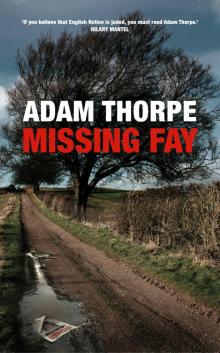 Missing Fay
Missing Fay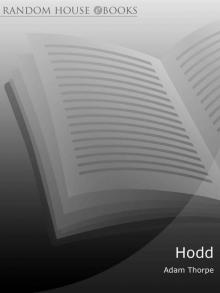 Hodd
Hodd Pieces of Light
Pieces of Light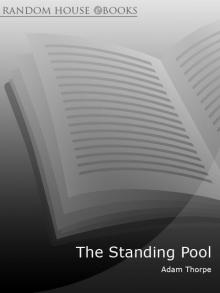 The Standing Pool
The Standing Pool Ulverton
Ulverton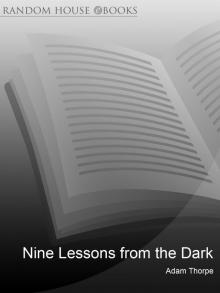 Nine Lessons From the Dark
Nine Lessons From the Dark Flight
Flight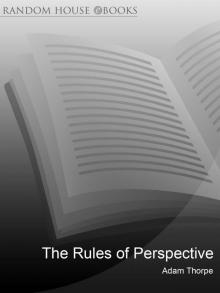 The Rules of Perspective
The Rules of Perspective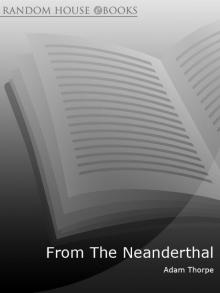 From the Neanderthal
From the Neanderthal Is This the Way You Said?
Is This the Way You Said?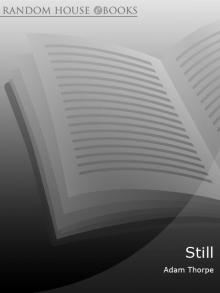 Still
Still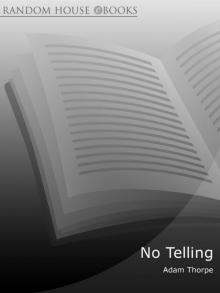 No Telling
No Telling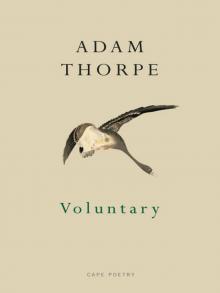 Voluntary
Voluntary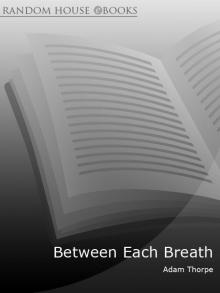 Between Each Breath
Between Each Breath